Toronto Summer Music: Douglas McNabney’s Last Call!
![]() Douglas McNabney was one of the first guests we interviewed for Conversations@theWholeNote.
Douglas McNabney was one of the first guests we interviewed for Conversations@theWholeNote.
![]() Douglas McNabney was one of the first guests we interviewed for Conversations@theWholeNote.
Douglas McNabney was one of the first guests we interviewed for Conversations@theWholeNote.
![]()
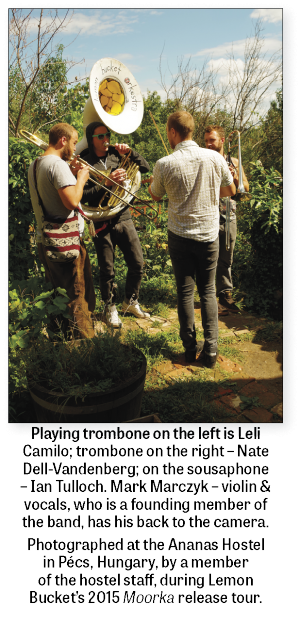 These boys of summer are members of Toronto’s Lemon Bucket Orkestra. They have lots of exciting reasons to blow their own horns, and no difficulty getting audiences to dance to their beat.
These boys of summer are members of Toronto’s Lemon Bucket Orkestra. They have lots of exciting reasons to blow their own horns, and no difficulty getting audiences to dance to their beat.
LBO began in 2010 as a four-person street busking band consisting of Mark Marczyk, violin and vocals, Oskar Lambarri, drum and vocals, Tangi Ropars, button accordion, and Alex Nahirny, guitar. In 2016, it’s now a band of 16-plus, rolling merrily into its sixth summer and gathering members as it goes, the way a rolling ball of burdock gathers more burdock: vocals, strings, winds, brass, percussion, including a range of world/folk instruments. The music is every bit as vigorous as “Balkan-klezmer-gypsy-party-punk-super band” suggests, and so is their schedule.
Counting Sheep: A Guerrilla Folk Opera is LBO’s current performance project. It’s an interactive video-music-dinner-theatre play about the Maidan Revolution, which will be performed August 5 to 29 at the Edinburgh Fringe Festival following its May 26 to June 5 Toronto run at Broadview Place. The Ukrainian polyphonic choral music, exuberant performances and powerful visuals offer a visceral experience of living with present-day revolution. Based on the 2014 Kyiv experiences of band-members Mark Marczyk and Marichka Kudriavtseva, the show includes the audience alongside the ensemble members in stylized white sheep masks – there is food and music and dancing for everyone, blurring the line between what is theatre and real life.
But before Lemon Bucket Orkestra takes off for Edinburgh they’ll be shaking things up here in Canada. They have Toronto concerts at Roy Thomson Hall (“Live on the Patio” series, June 23) and at the Opera House, with Romanian band Fanfare Ciocarlia (TD Toronto Jazz Festival, June 29) followed by appearances at eight Canadian festivals including the Hillside Festival (July 24, in Guelph), Ottawa Chamberfest (July 28), and then another concert at Toronto’s Mel Lastman Square (July 29).
Lemon Bucket’s newest recording Moorka, nominated for a 2016 JUNO Award, has just won a Canadian Folk Music Award – “World Group of the Year.” It includes folk songs the band learned on their last European tour from local musicians in Romania, Ukraine, Serbia, and Macedonia, but these are spiked and shaken up into the stirring musical mix LBO audiences now hunger for in Canada and around the world. By all accounts, no matter where the band is playing, people find themselves irresistibly drawn in – weirdly at home with and involved in music that is simultaneously exotic and familiar. This includes the passengers on a delayed Air Canada flight from Toronto to Frankfurt in 2012 who were treated to an impromptu concert while Lemon Bucket waited to take off for their “Balkan Station Romania Tour.”
![]() It’s no secret that summer, as far as the classical music scene goes, is Toronto’s off-season. As Lydia Perovic points out in her take on this year’s summer opera scene, though (see page 12), Toronto’s musical off-season tends to be a lot longer than most. If they haven’t already, most of our local music presenters are now wrapping up the last of their 2015/16 shows—which leaves a good three months of limbo until the beginning of 2016/17 in the fall.
It’s no secret that summer, as far as the classical music scene goes, is Toronto’s off-season. As Lydia Perovic points out in her take on this year’s summer opera scene, though (see page 12), Toronto’s musical off-season tends to be a lot longer than most. If they haven’t already, most of our local music presenters are now wrapping up the last of their 2015/16 shows—which leaves a good three months of limbo until the beginning of 2016/17 in the fall.
Of course, that implies that the city falls silent for most of June, July and August—which is far from the case. Summer music festivals abound, including local giants like Luminato, TD Toronto Jazz Festival and Toronto Summer Music. International artists often schedule Toronto into their summer tours and festival circuits, and local music-makers, who jump from gig to gig all year long, finally have the gift of much-needed time—to relax, or to plan projects of their own. And while the length of Toronto’s musical break might attest to the relative youth of our music scene, it makes these long summer months the perfect moment to look beyond business as usual, towards something new.
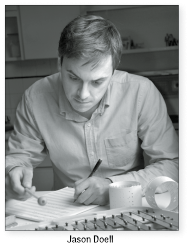 TCML: “Something new” pretty much sums up the motivation behind at least one of the musical projects in town this month. New this year, the Toronto Creative Music Lab (TCML) is a one-week workshop for early-career music-makers (June 19 to 24), where performers and composers are formed into small groups to collaborate on new works. Designed with the spirit of peer-to-peer collaboration in mind, the workshop focuses on building a community for early-career artists that is rich in opportunities for professional development. Full disclosure: I’m one of the participants this year. But – biased though I may be – during a time when the usual music scene is taking a breather, this program is just the thing to fill in some of the gaps, and build potentially fruitful musical relationships.
TCML: “Something new” pretty much sums up the motivation behind at least one of the musical projects in town this month. New this year, the Toronto Creative Music Lab (TCML) is a one-week workshop for early-career music-makers (June 19 to 24), where performers and composers are formed into small groups to collaborate on new works. Designed with the spirit of peer-to-peer collaboration in mind, the workshop focuses on building a community for early-career artists that is rich in opportunities for professional development. Full disclosure: I’m one of the participants this year. But – biased though I may be – during a time when the usual music scene is taking a breather, this program is just the thing to fill in some of the gaps, and build potentially fruitful musical relationships.
Composer Jason Doell and saxophonist Olivia Shortt, who are organizing the workshop alongside William Callaghan and Anastasia Tchernikova (Musica Reflecta) and Matthew Fava (Canadian Music Centre), are hopeful about what this project will do for emerging artists. “For me, peer-mentoring is essential for early-career artists and there is an opportunity in the Toronto contemporary music scene to facilitate these relationships,” says Doell. “While technical development in any discipline may be aided by the guidance of recognized experts, most professional relationships and opportunities arise within a peer group. Also…who knows more about being an early-career artist than those directly involved in being early-career artists? Peer-mentoring is a fantastic way to access the knowledge of people who are facing similar issues and obstacles to the ones you are facing today.”
“Toronto is abundant in programs for composers and performers seeking out more traditional styles of music and art practices but there isn’t as much for those seeking workshops that offer an approach to more current music,” adds Shortt. “Especially as a saxophonist, Toronto doesn’t offer much in the way of workshops and opportunities to network as a classical/new music performer. I’ve often had to seek these opportunities in other cities.”
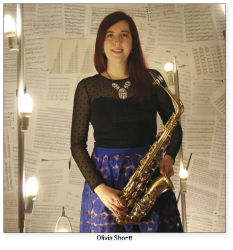 A project like TCML couldn’t come at a better time of year for people like me. Taking place at the end of June means that TCML can create these opportunities in Toronto, for participants, who at any other time would be busy at work, schools or conservatories all over the world. And for both organizers, June offers a moment to reflect on the rest of the year, and put their observations into action.
A project like TCML couldn’t come at a better time of year for people like me. Taking place at the end of June means that TCML can create these opportunities in Toronto, for participants, who at any other time would be busy at work, schools or conservatories all over the world. And for both organizers, June offers a moment to reflect on the rest of the year, and put their observations into action.
“[TCML] fits in well with my day-to-day life,” explains Doell. “I’m a full-time composer and I also create music educator programs, so a lot of what we are trying to accomplish at TCML is in the front of my mind regularly.” And for Shortt, an incoming masters student at the University of Toronto, being on the giving rather than the receiving end of a summer workshop has so far been a valuable experience. “This is one of the first projects for me that hasn’t been something I’m organizing for myself, like a recital or a tour,” she says. “And there’s a lot that school couldn’t teach me, so this has been the most practical educational opportunity that I’ve been a part of.”
For my part, the workshop will be a refreshing break from my rest-of-the-year schoolwork, and a welcome challenge after some time away from my instrument. It will be, in other words, the perfect summer vocation.
The final concert of TCML, featuring all of the premieres workshopped during the week’s rehearsals, takes place on June 24 at the 918 Bathurst Centre; details at tcml.ca.
Of course, Shortt and Doell aren’t the only ones with exciting musical plans in the works for the next three months. After speaking with them, we were inspired to get in touch with other local musicians to ask them this one thing:
How do you make use of Toronto’s long musical summer to recharge your musical batteries for the season ahead?
Here are some of their responses.
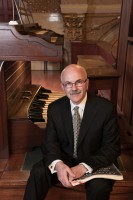 Name: Gordon Mansell
Name: Gordon Mansell
Instrument: Organ
How you might know him: Organist and music director at Our Lady of Sorrows Catholic Church; executive producer of ORGANIX CONCERTS
Summer Vocation: “I recharge by pushing my musical limits, by going to Europe to perform organ concerts in massive medieval cathedrals. The tour this coming August will be the result of my third invitation to perform in Poland (2012, 2015, 2016)...I am often the only Canadian in a festival of European organists and of course, it is an honour that I do not take for granted.
I am energized by learning and preparing new music for my concerts. For me, it is not a rest at all but a change and an opportunity to experience baroque instruments and the occasional example of the continuing vibrancy of the North German organ-building craft first-hand. By the end of this coming tour, I will have performed concerts on 11 different organs, including one museum organ dating back to 1653 in its original state. Overall, these concert tours are exhilarating opportunities for musical and personal growth.
My itinerary for this summer includes the first concert in Słupsk (August 11) followed by a very special performance as part of the Fiftieth International Organ Music Festival at St. Mary’s Cathedral (August 12 – Koszalin) and the Cathedral Basilica of St. James the Apostle (August 13 – Szczecin). After these concerts, my wife and I will then vacation in Germany and plan to visit Bach’s hometown and church, and play the famous Bach organ.”
Hear him this summer: Before Mansell departs for his tour, he plays a noontime organ recital on July 20, at All Saints Kingsway. Details in our GTA listings and at allsaintskingsway.ca.
 Name: Aimée Butcher
Name: Aimée Butcher
Instrument: Jazz vocalist
How you might know her: Performer at The Rex and Jazz Bistro; Singer-songwriter on debut 2015 CD The World Is Alright
Summer Vocation: “What I am looking forward to most about my summer vacation is a chance to create new musical memories. I have my first festival gig ever on July 31 at the TD Newmarket Jazz+ Festival, which I am very excited about, and plan to schedule a few house concerts up in northern Ontario around that date. I also plan to do a little bit of recording with a couple of bands that I am a part of, which is something that we had to wait to do until summer because all of us have been very busy throughout 2016. In addition to singing for some enjoyable gigs, I am looking forward to a reduced teaching schedule so that I may enjoy some time with family and friends over the summer, as well as taking some time to myself so that I may do some songwriting and planning for 2017.”
Hear her this summer: Butcher’s performs at the TD Newmarket Jazz+ Festival as part of the Sunday, July 31 lineup, at 3:30pm, in a set featuring songs from her debut album. Flip to our Green Pages (pages G1 to G10) in this issue to read up on what this festival, as well as 40 others, have planned for the summer ahead.
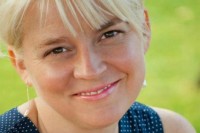 Name: Julia Wedman
Name: Julia Wedman
Instrument: Baroque violin
How you might know her: Violinist with Tafelmusik Baroque Orchestra, I FURIOSI and the Eybler Quartet
Summer Vocation: “Since I travel a lot and play so many concerts during the year, I like to have a little time away from that in the summer!
I love to recharge by filling my soul with beauty. I go to art galleries, gardens, beaches and parks. I look after the flowers and plants on my little terrace. I play music that I love but don’t have to play in a concert any time soon. I spend time with all of the people I love but don’t get to see enough during the concert season. A perfect summer day includes a little art, a little Bach, a lot of kids, a beautiful blue sky and a big long table in my backyard with way too much food on it, surrounded by beloved friends and family.”
Hear her this summer: The Tafelmusik Baroque Summer Festival runs from June 6 to 18, and features four free concerts by Tafelmusik musicians alongside students of the orchestra’s annual summer institute (TBSI). Details in our listings and at tafelmusik.org.
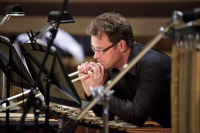 Name:Ryan Scott
Name:Ryan Scott
Instrument: Percussion
How you might know him: Artistic Director of Continuum Contemporary Music; percussionist with Soundstreams Canada, New Music Concerts, Esprit Orchestra and the COC
Summer Vocation: “Summertime is very special to me and I clear my schedule as much as possible for several weeks. My overwhelming priority is to spend meaningful quality time every day with my three children (11, 9 and 5) and my wife, harpist Sanya Eng. In addition to many excursions and activities, we’ll spend over two weeks camping on the shores of Lake Huron at The Pinery. I find it is absolutely necessary to stop performing like this every year so that I can recharge – as former Nexus member John Wyre once said “the less music I do, the better I play.” In the background, I will slowly prepare a new concerto, some newly commissioned recital repertoire and convert my doctoral dissertation on the emergence of the marimba in Tokyo to a book. I will also return to the faculty of the National Youth Orchestra of Canada to coach the chamber music program – I always leave feeling inspired. Of course, the work at Continuum never really slows down, but thanks to new technologies, one can get quite a bit of work done while waiting for the fish to bite!”
Hear him this summer: The National Youth Orchestra of Canada will present a festival of chamber music in collaboration with Wilfrid Laurier University in Waterloo, from June 22 to July 15. The festival will feature concerts by both faculty and youth orchestra members; entry for faculty concerts is by donation and entry to student concerts is free. Details in our listings and at nyoc.org.
Off-season though it may be, this summer offers no shortage of musical opportunities, for performers and concert-goers alike. Be sure to check thewholenote.com throughout the break, where, in addition to blog posts, concert reviews and news, we’ll continue to feature local musicians’ stories about how they’re spending their own summer vocations. And if you are a musician and want to share your own summer vocation plans, get in touch with us at
editorial@thewholenote.com (attach photos if you like). The coming months are starting to sound a lot more refreshing, already.
Sara Constant is social media editor at The WholeNote and studies musicology at the University of Amsterdam. She can be contacted at editorial@thewholenote.com.
![]() "
"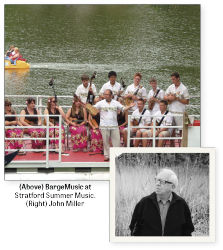 So you’re sweet sixteen?” I say to my guest. We’re sitting in The WholeNote office, mid-May – one of those “just-happened-to-be-in-town,” semi-spontaneous conversations that goes better for not having over-planned it. He chuckles. “I hadn’t quite thought of it that way” he says. “I’ve just been telling people we are in our teens. But if someone wants to come along and kiss us with a big fat donation, I wouldn’t say no.”
So you’re sweet sixteen?” I say to my guest. We’re sitting in The WholeNote office, mid-May – one of those “just-happened-to-be-in-town,” semi-spontaneous conversations that goes better for not having over-planned it. He chuckles. “I hadn’t quite thought of it that way” he says. “I’ve just been telling people we are in our teens. But if someone wants to come along and kiss us with a big fat donation, I wouldn’t say no.”
“Anyone particular in mind?” I ask. He fires right back. “If there was, I wouldn’t tell you!”
My guest this day is John Miller, artistic producer from the outset, 16 years ago, of Stratford Summer Music (SSM), that, for six weeks of the summer anyway, grabs a share of the spotlight from the Stratford Festival, the April-to-November theatrical juggernaut that has, over the course of its 60-year existence, completely reshaped the history of one small Ontario town.
“Is the elephant co-operative these days?” I tease. “Or are you guys two solitudes?”
Perhaps it’s the presence of the tape recorder, but he pauses for longer than usual, given his normal free-flowing conversational style. And then: “...I’m only choosing my words carefully” he says “because I don’t want any wrong impression to come out. By saying that we’re in our own spheres it doesn’t mean there aren’t occasions when we cross, or cooperate. But what we realize is they are a $60 million dollar big business, and we’re a $1 million small business, and it’s so easy to get crushed, or overwhelmed. So we tend to want to keep our own separate tracks, so that we can keep our own identity. Because I think it will always be the case that if you say ‘Stratford’ and ‘Festival’ in one breath, people think theatre. Because we started more than four decades behind them, that’s the thing. I often dream of what music would be like if the original concept of music at the Stratford Festival had been allowed to grow instead of being cut off as it was.”
“You mean the days of Louis Applebaum?” I ask. (Applebaum, the Stratford Festival’s resident composer for 43 years, had begun a separate Stratford Music Festival in 1955, two years after the establishment of the Theatre Festival.) Miller lights up. “Absolutely! When Glenn Gould was in charge of the music programming, Peter Pears and Benjamin Britten used to come. Elisabeth Schwarzkopf used to come. Duke Ellington would come. Those were great days.”
Part of the problem, he explains, is that music was deemed by the festival board to be too expensive, and so was cut out. “It is expensive,” he continues. “And it’s a psychological thing. You mount a (theatrical) production. It costs a lot, but it can run for six months. We don’t do that in music. You bring in a great orchestra or singer or somebody and it costs a lot of money, and what do they do? One concert, or maybe two if you’re lucky, and then away they go...But it’s not a case of ‘Oh we’re trying to bring music back.’ We’re not trying any more. We have succeeded in bringing music back, with its head held high.”
“If I’d had to guess, before looking at your website, I’d have thought you’d be making a meal of the ‘Shakespeare at 400’ thing this year,” I say, “But it looks like you’re being quite laid back about it, not whacking it over the head – you have a very diverse program.”
“Well, we’re probably doing the biggest thing in the city in regard to it,” he responds, “because we are bringing the choir from Shakespeare’s own church, the Holy Trinity Church, as the core of our choral programming this year, and they are bringing two programs of music they’ve been building up and singing to people visiting the church in their community. Their vicar is coming, and we’re going to team up with the local Anglican church here, plant trees in both churchyards...and on our lecture series music critic Robert Harris is doing a presentation on Shakespeare and music...and that’s a lot more than the Theatre is doing. So we are in fact carrying the ball on the salute to the 400th anniversary. Mind you, I could have done a whole festival based on that.”
“You could have,” I agree. “And it’s fantastic that you haven’t.”
One distinctive feature of Miller’s abilities as a curator is how deftly he spins multiple themes that weave through the course of a Stratford Summer Music season. For example, the choral strand this year, will also feature Daniel Taylor’s Theatre of Early Music (in a program of great anthems by Handel and Bach titled ‘Let The People Hear’), The Canadian Spotlight (a chorus of professional and semi-professional singers put together for SSM by conductor Mark Vuorinen) which does a full program of Canadian choral works, and the Harlem Gospel Choir, with, as Miller reveals, a significant guest.
“What you probably don’t know yet is that Measha [Brueggergosman] will come and sing with them. Last year we had The Blind Boys of Alabama – a huge success, hundreds of people, we were turning people away – and Ben [Heppner] came and sang with them, and I thought wouldn’t it be fun to carry that sort of spirit on. But who could sing with the Harlem choir? Measha was the natural and she agreed to come.”
"Tell about the other strands this year," I ask, and he obliges with gusto: there’s the always stellar piano series (“I’m really proud of the piano series. I just love piano. That’s part of it”; there’s 7am music on the banks of the Avon; a cabaret series ranging from "Trish O'Callaghan covering Cohen to Alex Samaras doing Sondheim, to Michael Occhipinti and friends doing John Lennon.” There will also be 30 hours of barge music in a wide range of genres; three “Bach walks” in “The Grove” with music supplied by the Charm of Finches flute ensemble and commentary by the local society of field naturalists society “on the double-breasted whatevers and the purple trillium”; Whiskey Jack (who backed up Stompin’ Tom for decades) will play at the local Legion “because I thought, well, where would Stompin’ Tom have played”; one of their trademark restaurant concert series will feature the world of harp music “from classical to celtic to baroque to Paraguyan to Senegalese to contemporary”; …the list, and his delight at all of it, seem boundless.
One element of Miller’s ability to bring about programming coups, like Heppner singing with The Blind Boys of Alabama last year or this year's Brueggergosman/Harlem Gospel Choir collaboration, relates to the formidable and diverse rolodex of musical contacts and musical acquaintanceships he has built up over a decade and a half here at Stratford Summer Music. (“The one part of my job I don’t like,” he says, “is how often I have to say no to people, now.”) Part of it doubtless also stems from previous sojourns with the Glenn Gould Foundation and before that the Canadian Music Centre.
But part of it also stems from a very savvy sense of what one might call the art of the necessary. Which arises from an acutely realistic understanding of the context in which he and SSM must operate. If he does his job right, around 65,000 people every season, who make it to Stratford for something else, will “happen across” SSM, and remember the fact that they did.
“How do you plan for people to stumble across you and how do you ensure that, no matter how long they stick around for, they go away appreciating the scope of the whole thing and the deftness of the weave?” I ask.
“It’s very interesting,” he says. “I am always running into people who say ‘I didn’t know there was a music festival here’ and then I’ll say ‘Well, did you hear the Andrew Collins Trio; did you hear the bluegrass?’ and they’ll say ‘Oh yeah I heard the bluegrass music down on that wonderful floating stage, downtown,’ but they just sort of thought it happened somehow.”
“But that’s the big challenge, isn’t it?” I ask. “Because your passers through, your Stratford Festival attendees, even your SSM regulars, are only going to get a tiny taste of it all, unless they are coming back every weekend or staying the week, which I would think isn’t easy to do given how busy the town is in theatre high-season.”
He pushes back a bit at that: “Well I suppose. But if you went to the Edinburgh Festival, or Ravinia, or any of these places, even if you come for the Stratford Theatre, you know, you don’t get it all at one time. You have to come back, or you take your chance on what has been programmed by some artistic director for the dates when you’re going to be there. That’s the way it is, and as the artistic director you have to understand that. My responsibility is to present you with a cultural smorgasbord at any given moment, so that you can pick and choose from it.”
The trick, he says, is to make sure that there is always a representative mix of ingredients so you come away with a sense of the whole.
Beyond Concertizing: Stratford Summer Music is also becoming an increasingly interesting educational destination, for public and students alike, most notably its TorQ Percussion Quartet residency, now in its fifth year, and a robust Vocal Academy which offers a jaw-droppingly fine ten-day residency to career-edge artists.
“The Vocal Academy is expanded this year,” Miller says, “with new faculty – Krisztina Szabó, Nathalie Poulin and Alison Pybus.” Pybus, he says, is a particularly significant addition. “We felt it was important that these edge-of-career singers have guidance in areas additional to voice. And management is something they need to understand and have insight into. Alison Pybus used to be the director of the vocal division at IMG. So she’s at the top of her field and will join [Michael] Schade and Phillip Addis and Emily Hamper, and Howard Dyck who lectures on oratorio, and Geraint Wynn-Davies who speaks to them about acting.”
Getting in is via a rigorous application process involving submission of recordings and CVs so they can be shipped to Schade, Hamper and Addis wherever they may be; at this point applicants come in from all over Canada, and elsewhere – “The furthest this year was New Zealand” he says. “And we sent posters to every music faculty in the country back in January.” It’s not a full scholarship opportunity but the ten days end up costing around $500, with billeting opportunities and/or housing in the nurses’ residence in town as options. “And of course while they are with us they get tickets to the theatre and everything else that’s going on in the Stratford environment.” The great thing, he adds, is that most of those vocal master classes are open to the public – “Alison Pybus will, for example conduct mock auditions, and then spend private time afterwards, giving feedback and going over each student’s promotional materials.”
Tellingly, the subsidizing of student participation in the Vocal Academy comes from the community itself – a grass roots initiative.
“What is extraordinary to me,” Miller says, “is how the community buys in. After all this time, living in Stratford, you understand how important the arts are, not just for the pocket book but for your own soul. Artists love to come here - 35,000 population, extraordinary restaurants and neighbours. I’m having fun. One heck of a good place, it really is. I am just happy to be lucky enough to do what I do.”
David Perlman can be reached at publisher@thewholenote.com
![]()
 A peculiar thing happens each year around mid-May in the largest, busiest city of Canada, the fifth largest North American city: mainstream Toronto opera life all but shuts down, give or take an intrepid indie daring a short early June run. And the season stays shut until the latter half of September. This year there’s an exception, a chamber opera at the Winter Garden in July thanks to the Toronto Summer Music Festival, but it’s likelier to be a one-off than a harbinger. Classical music lovers are somewhat luckier, with the TSO working full steam until the end of June, though it too starts the season late in September. Berlin, on the other hand, goes to the opera until early August and happily returns to it first week of September. Opera in Paris runs parallel with ballet until mid-July. London goes strong until mid-July and effectively has no respite with the Proms taking over from then on till mid-September.
A peculiar thing happens each year around mid-May in the largest, busiest city of Canada, the fifth largest North American city: mainstream Toronto opera life all but shuts down, give or take an intrepid indie daring a short early June run. And the season stays shut until the latter half of September. This year there’s an exception, a chamber opera at the Winter Garden in July thanks to the Toronto Summer Music Festival, but it’s likelier to be a one-off than a harbinger. Classical music lovers are somewhat luckier, with the TSO working full steam until the end of June, though it too starts the season late in September. Berlin, on the other hand, goes to the opera until early August and happily returns to it first week of September. Opera in Paris runs parallel with ballet until mid-July. London goes strong until mid-July and effectively has no respite with the Proms taking over from then on till mid-September.
Even regional European houses in small cities beat us in quantity and length. The opera house in Liège (population 200,000) has an eight-production season that runs until the end of June. Dutch National Opera in Amsterdam (population 780,000) starts its 12-production season early September and dovetails with Holland Festival on the other end to finish in early July.
What do the artists who make opera do in those four months that Toronto doesn’t do opera? And how do they explain our long break?
Soprano Ambur Braid recently returned home to Toronto after a Magic Flute run at the English National Opera in London, where she sang a wheelchair-bound Queen of the Night, and subsequently a very different, glammed-up Maleficent-like version of the same role at the Calgary Opera. “Evil royalty,” as she puts it, dramatic coloratura roles are becoming her calling card and one of her great historical research interests: those who attended the Canadian Art Song Project recital “The Living Spectacle” last winter were treated to a stand-up quality introduction to the wives of Henry VIII before her exceptional rendering of Try Me, Good King by Libby Larsen. She could not confirm or deny if she will return to the ENO in the near future, but I would bet on Yes, and on Verdi, the composer she’s starting to sing more, including the recital with Toronto Concert Orchestra at Casa Loma this May.
The voracious intellect whose interests range from Anne Boleyn to painter Stephen Appleby-Barr to Wes Anderson to caftans (if anybody will make them glamourous, it’ll be this statuesque soprano), Braid will combine work, study and travel this summer. “I’ll be singing the bitchy maid Dalinda in Richard Jones’ new Ariodante at the COC in September, so my June will be all Ariodante prep, all the time,” she says. She’ll also travel to Puglia to brush up her Italian, and try out agriturismo (“And eat and gain my preparatory weight,” she adds). “On August 6 I’m singing a recital of Rachmaninoff and Sibelius in Niagara-on-the-Lake, two new singing languages for me, and will be coaching all of that in July.” The COC rehearsals start on September 9.
We mull over possible reasons for the shortness of Toronto opera season, and wonder if it’s still presumed that since a lot of people of a certain class are out of town every weekend from May long weekend until Labour Day that everybody else is—or that they’re the only ones going to the opera. Opera tickets as a luxury item, opera audiences upper middle class? Sad state of affairs, if true, we agree. “Even in real estate,” she muses, “and in sales of clothes and jewellery, not a lot of people with buying power are in town in the summer, so that activity slows down.” The massive influx of tourists helps refill the audiences of London, Paris and Berlin during summer, she says after I bring up the European seasons. Is it about our habits, do we only do culture October to May? “It could be because we’re so young. Unlike Europeans, we are not brought up with it…And here, because it’s less subsidized and more expensive to go to the opera, you don’t go as often – it’s a special occasion thing. We say it shouldn’t be, but it is. And the relative rarity of performances also makes going to the opera a special event. You cannot show up at the opera house any day of the week and see something.” But she’s optimistic we’ll get there. “Hopefully we’ll get to the next step. Things are happening, it’s an exciting time to be in Canada.”
Christopher Mokrzewski has a similar take. “I get the feeling that Toronto is still a bit old-fashioned in that so much of the population takes significant time off in the summer. People are always travelling, are out of town, attending weddings and going to cottages, which makes it a little more difficult to maintain an active performance schedule with a diminished audience base,” writes the resident conductor at the Calgary Opera and music director of Against the Grain Theatre in an email. So musicians adapt and leave the city to work at festivals or train, like he’s about to do after wrapping up A Little Too Cozy, the AtG adaptation of Mozart/Da Ponte’s Così fan tutte. He’s taking a few days off in Toronto – “I’m desperate to get to a Jays game and see more concerts!” – before heading to St. Louis for a week on a professional development stipend from Calgary Opera. He’ll be working on bel canto repertoire with conductor Stephen Lord. The brilliant young musician is best known for the mashup of Schubert and Messiaen played with great conviction and drama in AtG’s “Death and Desire” last year, but his conducting interests are growing and it’s bel canto’s turn now.
He’s then off to Banff for six weeks, where he is music director for the Open Space Opera young artist program to conduct his first The Rape of Lucretia: his second one is the TSMF semi-staged performance at Winter Garden Theatre, Toronto’s one mainstream operatic exception of the summer. “I just love Banff to death. And I cannot wait for the real highlight of the summer, the Banff Centre Theatre Arts staff softball game. Big league!” Late July the AtG will perform at the Ottawa Chamber Fest, after which Mokrzewski returns to Calgary for a week of rehearsals and two weeks of performances at the Calgary Opera summer festival. “In late August and September I’ll likely be in Toronto and NYC for some professional development opportunities that are currently still in the works. Maybe I’ll take a few days off, if the mood strikes, and go on a road trip.”
Not a lot of leisure in Amanda Smith’s summer either. The emerging stage director and founding artistic director of FAWN Chamber Creative is already leaving her mark as one of the few movers within the Toronto Indie Opera network who embrace electronic music as essential for operatic creation and dance as essential to its performance. This approach was very much in evidence in Synaesthesia, FAWN’s recent six-composer workshop performance in the post-industrial area around Sterling Avenue that featured a dancer in pieces that alternate acoustic and electronic, live and tape. “I grew up listening to metal and noise music, it’s a big part of my life,” she says. The audience at Synaesthesia that night was mostly twentysomethings, and this was in part due to this bridging between the electronic music audience and the performing arts audience that those pieces proposed. “I also don’t want to charge people more than $20 per show. People are less willing to go to something unfamiliar if the tickets are more expensive. And us millennials are probably the most underemployed generation in a long while, with little disposable income.” One of the three audience-chosen pieces from the show will be commissioned into an opera. “We’re hoping to create a ballet lyrique and I want it to be sort of like devised theatre – only, devised opera. We have a workshop period, we’ll have a story, but the music will get devised.”
Smith’s degrees from Laurier and UofT are in voice and opera, but by the third year she knew she wanted to direct rather than sing. She’s since assisted a number of directors, including Michael Cavanagh for the world premiere of the now much-travelled Svadba by Ana Sokolović and Tim Albery for the landmark Grimes on the Beach at Aldeburgh Music Festival. Her summers so far have been about development. Last year she spent it in Quebec City observing the rehearsals for the new Robert Lepage production of L’Amour de loin and talking with the director (her theatre role model) about structuring rehearsals and getting the most out of people. This June she is travelling to Chicago to attend the Chicago Summer Opera program for two months. “I’ll be working with the director George Cederquist there. He does some exciting work, I’m really looking forward. I’m going to be mentored by him and have one-on-one seminars.” The two will work on Britten’s Albert Herring.
For the director Ashlie Corcoran there will be no summer vacation this year: the season at Thousand Islands Playhouse in Gananoque where she is artistic director actually runs May to October, and her recently completed run of the play Das Ding at Canadian Stage was her 12th production in as many months. Three of the ten productions at the Playhouse she’ll direct herself: Sondheim’s Into the Woods, Coward’s Blythe Spirit and Das Ding by Philipp Löhle, a German play about globalization that she enthusiastically describes as “wild.” She’ll also be preparing for the pieces she’s directing in the fall, Blythe Spirit in Kamloops, the school tour at the COC and in December, Soundstreams’ Electric Messiah. Then off to direct the revival of The Magic Flute at the COC, the show she already assisted under the direction of Diane Paulus, and directed herself for the Ensemble Studio performance, and later revived at Opera Philadephia.
What guides her programming at the Playhouse? “It’s a year-long occupation, I’m always reading plays, seeing musicals, thinking about it constantly, and any time I see something that I’m interested in, I put it on a list or add it to the pile. And once I start programming, I see how all the pieces would fit together. It all needs to be high quality, intelligent, entertaining work, but I’m also looking for work that’s different and that sort of bounces up against each other, rubs against each other in interesting ways.” The audience is more of a regional theatre audience than summer audience, very diverse with very diverse expectations, and Corcoran aims to meet those but also to propose new and unexpected experiences. She says she can certainly imagine doing a chamber opera in the smaller Fire Hall in the future. “Last year we did an operetta, The Pirates of Penzance. I adapted it with Andrew Kushnir and we set it in 1927 in the prohibition times in the Thousand Islands. We re-wrote the libretto—Gilbert & Sullivan are in the public domain - so the pirates were rum runners, the police were the American coast guard, the sisters were a federation of teetotallers. We kept a lot of the original music, but we also included some other music from the 1920s. It was successful and great fun, and I hope to do it again in the future.”
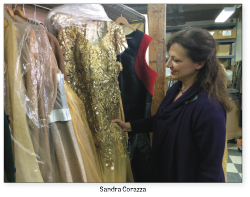 Over at the COC, the costume department staff are already working on the two September productions. Sandra Corazza, COC’s costume supervisor tells me how her summer will unfold while giving me a tour of the third floor workrooms and storage spaces. The costumes for Ariodante and Norma are already there, shipped from their most recent dwelling places, the opera houses of Amsterdam and Barcelona respectively. The Handel was designed by Ultz with a mid-20th century Scottish village aesthetic, and there are a lot of old coats, wool sweaters and plain dresses on the rows of hangers before us. Corazza already saw the production in Amsterdam. “It’s good to be able to go backstage and ask the makers – dressers, makeup artists – what problems they had. Some of that stuff can’t be written precisely enough, even though we get the bible.” (The thick binder containing all the fabric samples, purchase information, sketches and photos is known as “the bible” among costume professionals.)
Over at the COC, the costume department staff are already working on the two September productions. Sandra Corazza, COC’s costume supervisor tells me how her summer will unfold while giving me a tour of the third floor workrooms and storage spaces. The costumes for Ariodante and Norma are already there, shipped from their most recent dwelling places, the opera houses of Amsterdam and Barcelona respectively. The Handel was designed by Ultz with a mid-20th century Scottish village aesthetic, and there are a lot of old coats, wool sweaters and plain dresses on the rows of hangers before us. Corazza already saw the production in Amsterdam. “It’s good to be able to go backstage and ask the makers – dressers, makeup artists – what problems they had. Some of that stuff can’t be written precisely enough, even though we get the bible.” (The thick binder containing all the fabric samples, purchase information, sketches and photos is known as “the bible” among costume professionals.)
The forthcoming COC run will have an entirely new set of principals, some of whom are as physically different from their peers cast in the same roles in Aix-en-Provence and Amsterdam as imaginable. The petite green ensemble now on a mannequin will have to be adjusted for the taller Ginevra by Jane Archibald. Dalinda too – the “bitchy maid” to be revived by Ambur Braid – will probably have her clothes resized. “This wedding dress,” Sandra pulls out a long sturdy white gown with modest ornaments. “It never gets worn properly, she sort of slaps it on over her slip, then sees the puppet show and takes it off, and Dalinda puts it on at one point…It’s handled more than actually worn.” The trouser role baddie will be sung by Verduhi Abrahamyan, a mezzo taller than Sonia Prina, whose name is still attached to her biker style costumes. Alice Coote’s Ariodante will be the same height as his love interest, and it remains to be decided whether she’ll be slightly raised with the right pair of shoes. For costume resizing, the seam allowance and long hem come to the rescue.
Ultz is expected to arrive in Toronto by the end of June, but meanwhile the fittings for the smaller roles are already starting. “We still don’t have the casting of the chorus, six male and six female, and 24 and 24 in Norma. Once we know that, we will know now many costumes we have to build. In Aix and Amsterdam, they had these sweaters custom knit. If these are too small, we may have to find a knitter to knit us a sweater, or go with a different costume. If Ultz decides to redesign the chorus and the extras, we’ll have to make these costumes happen.”
The gold sequin-encrusted dress by the costume designer Jessica Jahn is already fitted and waiting for Sondra Radvanovsky’s Norma. “When we get the Barcelona bible, we can find out where all these fabrics came from and start contacting these companies. We may add more red to Russell Thomas’s costume. Details often get changed when productions move from stage to stage.” The fitting of the principals and chorus starts in earnest on the third week of August. There are also the understudies to clothe, and in Norma, the children. Corazza will take a vacation too, but July is the only possibility. The 2016/17 season is already underway on the third floor of the COC’s Front Street East building.
Lydia Perovic’s novella All That Sang is out now wherever you buy books. As for her June, she’s off to Amsterdam for some Herheim-directed opera, Jacobs-conducted Haydn and Joël Pommerat’s theatrical take on the French Revolution. After a few additional days in Antwerp and Brussels, she’s back in Toronto for the summer.